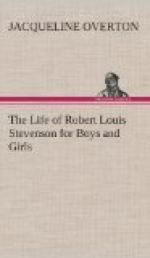After their return to Edinburgh came the time when, his school days finished, Louis must make up his mind what his career is to be and train himself for it.
Even then he knew what he wanted to do was to write. He had fitted up a room on the top floor at Heriot Row as a study and spent hours there covering paper with stories or trying to describe in the very best way scenes which had impressed him. Most of these were discarded when finished. “I liked doing them indeed,” he said, “but when done I could see they were rubbish.” He never doubted, however, that some day his attempts would prove worth while, if he could only devote his time to learning to write and write well.
His father, he knew, had different plans for him, however. Of course, Louis would follow in his footsteps and be the sixth Stevenson to hold a place on the Board of Northern Lights. So, although he had little heart in the work, he entered the University of Edinburgh and spent the next three and a half years studying for a science degree.
The summer of 1868 he was sent with an engineering party to Anstruther, on the coast, where a breakwater was being built. There he had his first opportunity of seeing some of the practical side of engineering. It was rough work, but he enjoyed it. Later he spent three weeks on Earraid Island, off Mull, a place which left a strong impression on his mind and figured afterward as the spot where David Balfour was shipwrecked.
Among the experiences at that time which pleased him most was a chance to descend in a diver’s dress to the foundation of the harbor they were building. In his essays, “Random Memories,” he tells of the “dizzy muddleheaded joy” he had in his surroundings, swaying like a reed, and grabbing at the fish which darted past him.
In writing afterward of these years he says: “What I gleaned I am sure I do not know, but indeed I had already my own private determination to be an author ... though I haunted the breakwater by day, and even loved the place for the sake of the sunshine, the thrilling sea-side air, the wash of the waves on the sea face, the green glimmer of the diver’s helmets far below.... My own genuine occupation lay elsewhere and my only industry was in the hours when I was not on duty. I lodged with a certain Bailie Brown, a carpenter by trade, and there as soon as dinner was despatched ... drew my chair to the table and proceeded to pour forth literature.
“I wish to speak with sympathy of my education as an engineer. It takes a man into the open air; keeps him hanging about harbor sides, the richest form of idling; it carries him to wild islands; it gives him a taste of the genial danger of the sea ... and when it has done so it carries him back and shuts him in an office. From the roaring skerry and the wet thwart of the tossing boat, he passes to the stool and desk, and with a memory full of ships and seas and perilous headlands and shining pharos, he must apply his long-sighted eyes to the pretty niceties of drawing or measure his inaccurate mind with several pages of consecutive figures.”




